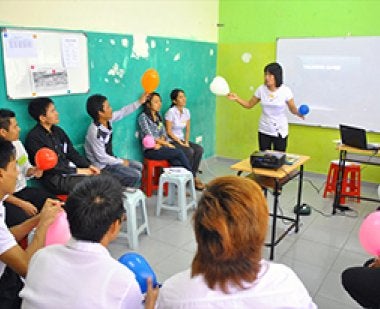
COLLEGE PARK, MD (May, 2017) – The record global refugee crisis has left more than 33 million child refugees in need of education. The crisis underscores the importance of post-conflict refugee education that serves students, addresses trauma, and provides support for teachers of refugee students. Teachers of refugees often face significant challenges due to lack of resources and complexity of student needs. With little research on post-conflict refugee education, especially in the developing world, UMD College of Education Assistant Professor Colleen O'Neal led the first study on promoting classroom management and teacher self-care in this setting.
“Fewer than 50 percent of refugee children receive post-conflict education. Those that do, are often taught in overcrowded classrooms by teachers who are refugees themselves, who may have little training and few resources,” Dr. O’Neal said. “We know that stress can affect students’ ability to learn and behave in classrooms and that many refugee teachers burn out, which is why it is critical to provide tailored trainings and support to those who teach refugees.”
The study, published in the Journal of Educational and Psychological Consultation in April 2017, found that a teacher education intervention delivered to refugee teachers in Malaysia increased classroom management confidence and knowledge, as well as teacher self-care, whether the training was provided by either professional or peer-trained refugee teachers.
In Malaysia, where the refugee population is primarily from Burma, refugees are considered illegal immigrants and are not allowed to attend public schools. Refugee students often receive ad hoc education in informal settings, where they are taught by teachers with low levels of education. The ability of peer trainers to effectively deliver this intervention to other teachers increases its feasibility and sustainability in refugee schools.
The study examined the effects of the culture-specific Resilient Refugee Education intervention, which consisted of training refugee teachers over two days on topics such as refugee student mental health, emotion management, positive discipline, and teacher self-care issues like anxiety and stress management.
The quasi-experimental study design compared the effects of these teacher education trainings on 38 peer trainers, who were refugee teachers trained by consultants, with those on 78 peer trainees, who were refugee teachers trained by peer trainers. In all, ninety-seven of the teachers were refugees themselves and the majority were Burmese. From pre- to post-intervention, both groups increased in classroom management confidence and knowledge, as well as self-care, with differences in effects by education and gender.
In future iterations of the research, Dr. O’Neal and her research team suggest tracking the effect of this intervention on student outcomes, as well as using randomized cohorts.
Dr. O’Neal is a faculty member in the Department of Counseling, Higher Education, and Special Education who specializes in research on emotions and mental health issues among underserved, ethnic minority children, as well as teacher training related to addressing mental health needs in these populations.



